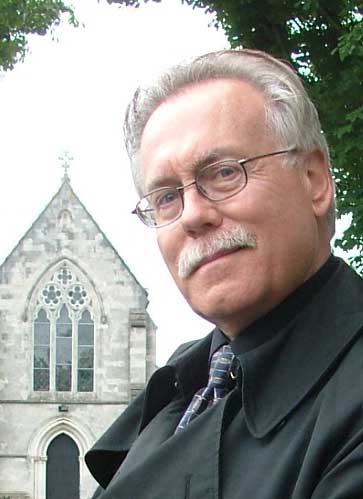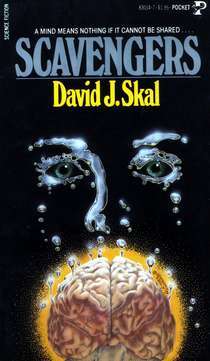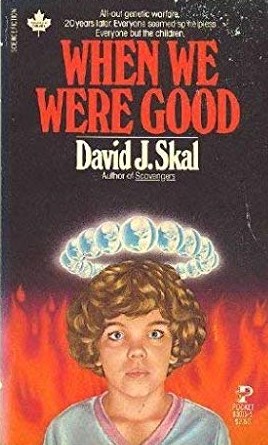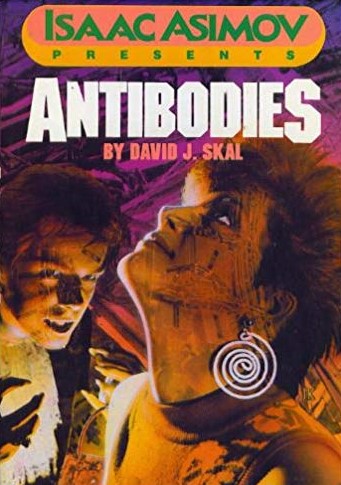 David J. Skal is a name that should be identifiable to most horror fans. You DVD buffs will likely recognize Skal as the guy who does the audio commentaries for Universal’s FRANKENSTEIN, DRACULA and FREAKS discs, while those of you who read books know him as the author of several nonfiction works relating to the genre, including HOLLYWOOD GOTHIC (about the tangled history of DRACULA), DARK CARNIVAL (a biography of FREAKS director Tod Browning), DEATH MAKES A HOLIDAY and ROMANCING THE VAMPIRE.
David J. Skal is a name that should be identifiable to most horror fans. You DVD buffs will likely recognize Skal as the guy who does the audio commentaries for Universal’s FRANKENSTEIN, DRACULA and FREAKS discs, while those of you who read books know him as the author of several nonfiction works relating to the genre, including HOLLYWOOD GOTHIC (about the tangled history of DRACULA), DARK CARNIVAL (a biography of FREAKS director Tod Browning), DEATH MAKES A HOLIDAY and ROMANCING THE VAMPIRE.
But I know David J. Skal best as a writer of dark fiction, and one of the most distinctive such authors on the scene. I base this claim on three novels—SCAVENGERS, WHEN WE WERE GOOD and ANTIBODIES, all published in the early to late eighties—that established a distinct and assured voice with a real storytelling flair and affinity for the grotesque.
But I know David J. Skal best as a writer of dark fiction, and one of the most distinctive such authors on the scene.
Skal’s fictional output began with SCAVENGERS (Pocket) in 1980, an unassuming-looking sci fi paperback that must have knocked unsuspecting readers for a loop. A mind-blower in every sense of the term, it’s a hallucinatory look at a future world where “mind sharing” is all the rage, a process accomplished through a serum that allows people to inhabit each other’s brains. This proves irresistible to Brian, a distraught guy who’s just lost his girlfriend Kelly. Brian happens to stumble onto Tracy, an enthusiastic mind-sharer, and thinks he’s found the perfect vessel to inhabit his beloved’s body. But things don’t quite work out as planned: Old resentments resurface, leading to a profoundly intense three-way psycho-fest.
What SCAVENGERS heralded was a sensibility as twisted and thought-provoking as those of J.G. Ballard and David Cronenberg, packed into a fast, furious framework and lean 204-page count with nary an ounce of padding. It is quite simply the ultimate story of psychic warfare, handily beating out similarly-themed works like William Hjortsberg’s GREY MATTERS and Gene Snyder’s MIND WAR.
The following year brought us WHEN WE WERE GOOD (Pocket), another compact depiction of a horrific future that’s nearly as powerful as its predecessor. In this novel’s nightmarish world a nuclear war has hopelessly scrambled the genetic codes of humanity. Enter the children, seemingly perfect specimens created by the government to be pawed and molested by all-too willing adults. But the kids have their own malicious agenda, which becomes clear when one of the tykes is delivered to Kevin and Linda, a childless couple in for far more than they (or us) could possibly imagine. Sound grim? It is, and grows steadily more so as it advances.
It took another seven years for Skal’s next book to appear, but the wait was worth it: 1988’s ANTIBODIES (Congdon & Weed) was and is Skal’s most monumental and ambitious novel. Packed with arresting H.R. Giger-esque imagery, it wreaked a demented twist on the then-burgeoning cyberpunk literary movement while fully retaining the economy of the earlier books.
Like SCAVENGERS before it, ANTIBODIES was packaged as straight sci fi, under the “Isaac Asimov Presents” label, which doubtlessly freaked out many readers. From one online review: “I have never quite forgiven Asimov for failing to mention that this wasn’t just near-future SF but a really gross and disturbing horror novel about the hatred of the body, anorexia, and graphic self-mutilation.”
ANTIBODIES is indeed about all those things, being a disquieting look at the ultimate consequence of humanity’s flirtation with technology: the Antibody phenomenon, referring to those who want to put aside their “prisons of flesh” and become robots. They’re encouraged by a shadowy organization called the Cybernetic Temple, which distributes a series of videotapes that seduce disaffected people into joining their cause. Countering this is Julian, a nutcase who runs an outfit dedicated to reprogramming Antibodies.
At the book’s center is Diandra, a severely disturbed young woman caught between these two opposing forces; she’s an Antibody to her core, yet part of her finds the whole movement terrifying. When Julian captures Diandra for a reprogramming session he’s in for a shock, as she proves harder to break than any of his other clients. The book excels in grotesque and surreal set pieces that reach their apex in the final pages, wherein disease and insanity unite in a veritable carnival of blood, viscera and technology run amok.
There was nothing else like ANTIBODIES in 1988. Back then I ranked it with CRASH and THE WASP FACTORY, and although ANTIBODIES hasn’t held up quite as well as either, it has proven fairly influential (I have no idea if filmmaker Sogo Ishii, who made 1994’s ANGEL DUST, or Todd Haynes, writer-director of 1995’s SAFE, have read the book, but both films appear to bear its influence).
Sadly, ANTIBODIES was to be Skal’s last foray into fiction writing. I’ve heard tell of a subsequent project called EAT ME, said to be “a novel about anorexia that eats THINNER for breakfast”, but it has yet to be published.
That leaves us with the author’s many nonfiction tomes, of which I particularly recommend 1993’s THE MONSTER SHOW (and the revised edition published in 2001). It’s an alleged “Cultural History of Horror” that’s in actuality a highly idiosyncratic survey of the genre, with a core eccentricity fully befitting the author of SCAVENGERS and ANTIBODIES. The book’s subjects include FREAKS director Todd Browning, the fifties genre icon Vampira, the notorious CARRIE musical, make-up effects artists, Fangoria conventions, transsexual surgery, Michael Jackson(!) and the rise of splatterpunk. The end result is a weird, wonderful and unputdownable account.
Of course THE MONSTER SHOW is still in print. The other books outlined above are not, and nor do they receive much air time any more (from Skal or anyone else). I, however, believe it’s past time that SCAVENGERS, WHEN WE WERE GOOD and ANTIBODIES were given their rightful due as intelligent and unflinching classics of straight-up horror.



